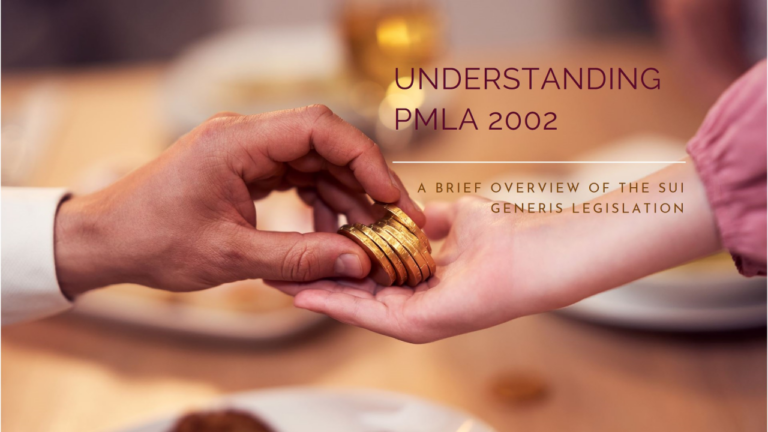
PMLA 2002 – A Sui Generis Legislation
Brief Understanding of Money Laundering
Brief understanding of Money Laundering ~ The Act of Money Laundering has both Civil and Criminal consequences for the perpetrator of the crime.
Civil Consequences under the PMLA: Property Attachment, Adjudication, and Confiscation Process
To deal with the Civil consequences, the Act creates and empowers the Authorities with the power of a Civil court to summon, direct the production of documents and evidence and adjudicate on the issue of whether any property is involved in the money laundering or not and accordingly once the property so involved in money laundering is found to be proceeds of crime, the respective authority goes ahead and makes an order for provisional attachment of that property and sends a complaint in this regard to the Adjudicating Authority within 30 days from the date of provisional attachment of that property for confirmation of the same along with necessary evidence. The Adjudicating Authority further summons the concerned person and affords him/her a proper hearing on the issue of attachment of property. The person is so aggrieved by the order of Adjudicating Authority qua attachment of property in question, may file an appeal to the Appellate Tribunal against the order of confirmation of attachment and furthermore to the High Court if so aggrieved. Thus, in a nutshell, as a Civil course, the PMLA deals with attachment, adjudication and confiscation of property in question.
Criminal Consequences under PMLA: Punishment, Trial, and Confiscation of Property
However, as a criminal consequence, the offence of Money Laundering as defined in sec 3 of the PMLA Act is punishable under sec 4 and for any scheduled offence connected to the offence of Money Laundering and is further triable by the Special Court (Session Court) as Session Trial Case. The PMLA Act deals with one and only one offence i.e., Money Laundering as defined in sec 3. If the property attached is found to be proceeds of crime after the conclusion of the trial, the property stands confiscated and vested to the Central Government, whereas if the property is not found to be proceeds of crime, in that case, the Special Court shall order the release of that property in favour of the person who is so entitled to and thus the confiscated property can be restored to the rightful and bonafide claimant.
Criminal Investigation Process under PMLA: Role of Empowered Officers and Filing of Complaints
While dealing with the Criminal consequence under sec 3 of the PMLA Act, the investigation under the Act is not in any way analogous to the investigation carried out by the Police, the empowered officer under PMLA can file a complaint in terms of Sec 44 (1)(b) of PMLA 2002 before the Session Court.
Admissibility of Statements under Section 50 of PMLA: Judicial Proceedings and Evidence Requirements
So far as summon u/s 50 (2 & 3) is concerned, the statement recorded under this section by the respective authority is deemed to be a Judicial proceeding for the purpose of sec 193 & 228 IPC and is not hit by sec 25 of the Evidence Act and further it is not like a statement recorded by Police u/s 161 CrPC. Thus, it is admissible in law, however, it is only prima facie evidence and needs independent corroboration before being considered as evidence for the purpose of convicting a person on the basis of evidence so recorded.
Arrest and Bail Provisions under PMLA: Conditions and Discretionary Powers of the Special Judge
he most haunting element of this Act for the accused is the provision of arrest & bail which is contained in sec.19 &45 of the Act respectively wherein the officer so designated or authorised to effect arrest, has on the basis of material in his possession, reason to believe that any person is guilty of an offence punishable under this Act, he may arrest such person after reducing his “reason to believe “in writing and shall, as soon as may be, inform him of the grounds for such arrest. Whereas for securing bail under the act, the accused is required to satisfy the twin conditions as contained in sec 45 of the act or that he/she is covered under the exception clause but still subject to the discretion of the special judge PMLA.
Reverse Presumption under PMLA: Shifting the Burden of Proof to the Accused
That apart, the most significant feature under PMLA 2002 is that there is a provision of reverse presumption in sharp contrast to the very cardinal principle of criminal jurisprudence that an accused is innocent until proven guilty and thus, the burden of proving that proceeds of crime are untainted shall lie on the accused.
Overriding Effect of PMLA: Strengthening its Application Across Other Legislation
Further, this legislation has been given an overriding effect in order to strengthen its application with respect to other legislations/Acts
Conclusion
The relevance of this Act lies in the object & the statement of enactment which is significant to know about the necessity of such legislation as it finally strengthens the financial & economic health of the nation.
The views are personal.

